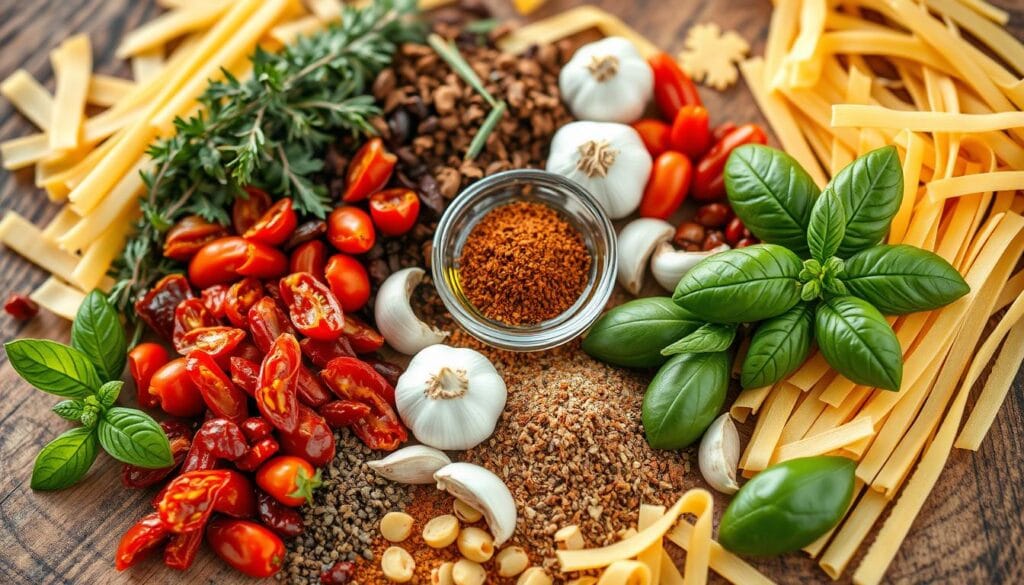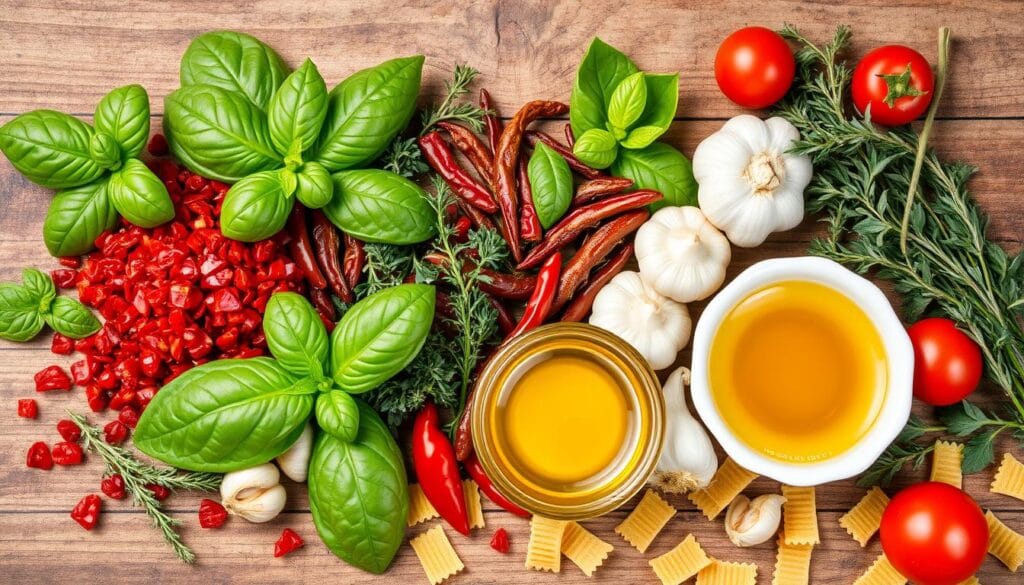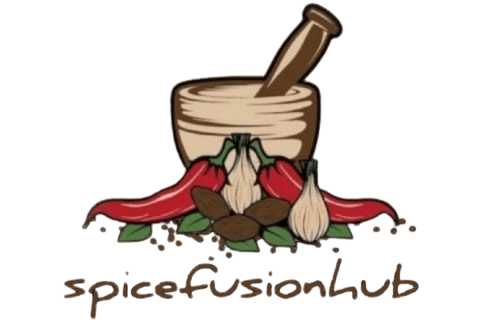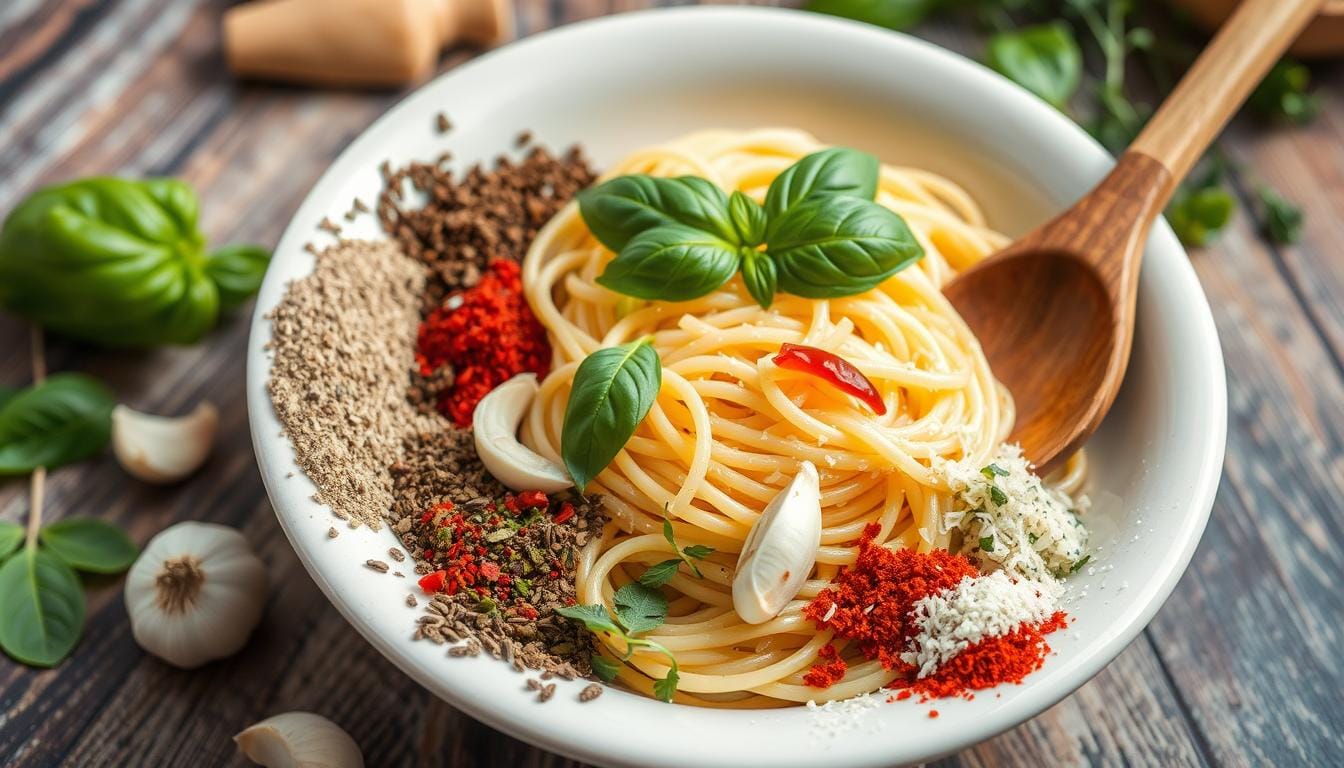7 Profound Spices For Pasta Dishes To Elevate Flavor
Table of Contents
What makes a pasta dish stand out? Is it the pasta type, the sauce, or something else? Spices play a big role in making pasta dishes special. Italian spices, in particular, are loved for adding depth and warmth to pasta.
With the right spices, a simple pasta dish can become a masterpiece. But, which spices will take your pasta to the next level?
Key Takeaways
- Italian spices for pasta are essential for creating authentic Italian dishes
- Spices for pasta dishes can add depth and warmth to a variety of recipes
- Pasta seasoning is a key element in elevating pasta dishes
- Understanding how to use spices for pasta dishes can take your cooking to the next level
- Experimenting with different spices for pasta dishes can help you find your favorite flavors
- Italian spices for pasta can be used in a wide range of dishes, from classic spaghetti to creative fusion recipes
Understanding the Basics of Pasta Seasoning
To make tasty pasta dishes, knowing how to season is key. It’s about mixing the right herbs and spices to enhance flavors. Timing is everything; adding spices at the right moment can make a big difference, but too much can spoil it.
Using fresh herbs can greatly improve the taste of pasta. But, dried spices can also work well, especially when mixed with other ingredients. The goal is to find the perfect balance and use the best spices for spaghetti to create a great flavor.
The Role of Spices in Pasta Dishes
Spices are crucial in pasta dishes, adding depth and complexity. Common spices include basil, oregano, and thyme. These herbs can be used fresh or dried, depending on the flavor and texture you want.
Timing Your Seasoning
Seasoning pasta dishes at the right time is vital. Adding spices too soon can dull the flavor, while adding them too late can make it unbalanced. It’s best to add spices during cooking, letting the flavors blend together.
Fresh vs. Dried Spices
Fresh spices give pasta dishes a bright, vibrant taste. Dried spices offer a more subtle, nuanced flavor. The choice between fresh and dried spices depends on the flavor you want and the pasta dish type. By mastering pasta seasoning and using the right herbs and spices, home cooks can make delicious pasta dishes like restaurants.
Essential Italian Herbs for Traditional Pasta Recipes
Italian cuisine is famous for its rich flavors. Italian spices for pasta are key in making these flavors. Certain herbs are crucial for adding depth and aroma to traditional pasta recipes. Seasoning for pasta recipes is an art that requires knowing the different herbs and how they work together.
Basil, oregano, and thyme are common Italian herbs for pasta. They can be used fresh or dried. Basil is great in pesto sauces, while oregano is perfect in tomato-based sauces. Thyme adds a savory flavor when used with other herbs.
When using Italian spices for pasta, remember that seasoning for pasta recipes is a matter of taste. Some like strong flavors, while others prefer subtle ones. Here are some tips for using Italian herbs in pasta recipes:
- Use fresh herbs whenever possible for the best flavor.
- Combine different herbs to create a unique flavor profile.
- Don’t overseason, as this can overpower the other ingredients.
| Herb | Flavor Profile | Common Uses |
|---|---|---|
| Basil | Sweet and aromatic | Pesto sauces, caprese salads |
| Oregano | Pungent and earthy | Tomato-based sauces, pizza |
| Thyme | Savory and slightly minty | Soups, stews, meat dishes |
Mediterranean Spice Combinations for Pasta Dishes
Mediterranean pasta seasonings are key to making tasty pasta dishes. The area’s herbs and spices can make any pasta recipe stand out. Oregano, thyme, and rosemary are common in Mediterranean cooking, adding depth and flavor.
To make pasta dishes with a Mediterranean twist, knowing the spice combinations is crucial. Greek-inspired combinations often include feta cheese, kalamata olives, and sun-dried tomatoes. They’re mixed with oregano and thyme. On the other hand, Southern Mediterranean blends might have garlic, lemon, and chili flakes, typical in gourmet pasta spices.
Popular Mediterranean Spice Combinations
- Greek: oregano, thyme, feta cheese, kalamata olives
- Southern Mediterranean: garlic, lemon, chili flakes, paprika
- Coastal Italian: basil, rosemary, olive oil, garlic
Trying out these Mediterranean spice mixes and using gourmet pasta spices can lead to amazing pasta dishes. Whether you’re an experienced chef or just starting, these seasonings will spark your creativity. They bring the Mediterranean’s rich flavors to your table.

| Spice Combination | Ingredients | Flavor Profile |
|---|---|---|
| Greek | Oregano, thyme, feta cheese, kalamata olives | Savory, tangy, herbal |
| Southern Mediterranean | Garlic, lemon, chili flakes, paprika | Spicy, citrusy, smoky |
| Coastal Italian | Basil, rosemary, olive oil, garlic | Herbal, aromatic, rich |
Garlic and Onion: The Foundation of Flavorful Pasta
Garlic and onion are key to making tasty pasta dishes. They add depth and richness to pasta seasoning. Sautéing them in olive oil makes a great base for pasta sauce.
Here are some tips for using garlic and onion in your pasta dishes:
- Use fresh garlic for the best flavor
- Sauté the onion until it’s translucent and caramelized
- Combine garlic and onion with other Spices for Pasta Dishes for added flavor
Adding garlic and onion to your pasta seasoning can make your dish taste better. Try mixing them with herbs and spices for a unique flavor.
Garlic and onion make your pasta dishes flavorful and aromatic. Try different Spices for Pasta Dishes and pasta seasoning to find the perfect taste for your next pasta dish.
Spices for Pasta Dishes: A Complete Flavor Guide
Choosing the right spices is crucial for tasty pasta dishes. Whether you’re making spaghetti or looking for new pasta recipe ideas, knowing your spices is key. Aromatic spices like basil and oregano bring a fresh taste. Heat-adding spices, such as red pepper flakes, add a bold kick.
Umami-enhancing options like mushrooms and soy sauce add depth. Mixing these spices creates complex, balanced flavors. For instance, a classic spaghetti recipe might use garlic, onion, red pepper flakes, and mushrooms.
Aromatic Spices
- Basil
- Oregano
- Thyme
Heat-Adding Spices
- Red pepper flakes
- Crushed black pepper
- Paprika
Umami-Enhancing Options
- Mushrooms
- Soy sauce
- Seaweed
Exploring different spice combinations can lead to many tasty pasta dishes. Whether you want a classic spaghetti or something new, the right spices are essential for perfect flavor.
Creating Custom Spice Blends for Different Pasta Styles
To make your pasta dishes better, try making your own spice blends. Use Italian spices and herbs to match your taste. Start by mixing herbs like basil, oregano, and thyme. Then, add spices like garlic powder, onion powder, or red pepper flakes.
Some favorite spice blends for pasta are:
- Italian-Style: a mix of Italian spices for pasta, including oregano, basil, and thyme
- Mediterranean-Style: a blend of herbs for pasta dishes, featuring oregano, rosemary, and lemon zest
- Spicy-Style: a combination of Italian spices for pasta and red pepper flakes for an extra kick
When making your spice blends, balance the flavors. Adjust the amounts to your taste. You can also add lemon juice or olive oil to make it even better. By trying different mixes, you’ll find the perfect blend for your pasta.
Global Influences: International Spices in Modern Pasta
Exploring pasta reveals how global tastes are changing modern dishes. Chefs and home cooks are mixing new flavors with traditional pasta. This blend of international spices and classic pasta recipes brings unique and exciting dishes to the table.
From Asian fusion to Middle Eastern and Latin American flavors, the options are vast. Adding gourmet pasta spices and Mediterranean seasonings can deepen pasta flavors. Ingredients like soy sauce, sesame oil, and sumac create bold, aromatic tastes.
Asian Fusion Combinations
Asian fusion pasta often includes ginger, garlic, and chili flakes. Mixing these with Mediterranean seasonings makes for a unique sauce. Some standout dishes are:
- Spicy shrimp pasta with ginger and chili flakes
- Sesame noodle salad with soy sauce and sesame oil
- Thai-inspired pasta with lemongrass and basil
Middle Eastern Inspirations
Middle Eastern cuisine is famous for its rich spices like cumin, coriander, and sumac. These can flavor pasta with a Mediterranean twist. Some notable dishes include:
| Pasta Dish | Spices and Ingredients |
|---|---|
| Spicy lamb pasta | Cumin, coriander, sumac, and chili flakes |
| Roasted vegetable pasta | Sumac, paprika, and garlic |
| Herbed pasta salad | Parsley, dill, and lemon juice |
By embracing global flavors and using gourmet spices, cooks can craft unique pasta dishes. These dishes highlight the rich diversity of international cuisine.
Common Seasoning Mistakes to Avoid
Using the right spices for pasta dishes can make a big difference. But, even with the best seasoning, mistakes can ruin the taste. To make tasty pasta, avoid over-seasoning, timing errors, and storage mistakes.
Understanding how to use spices well is key. Over-seasoning can hide the natural flavors of your ingredients. Timing errors can lead to dishes that are too salty or not salty enough. Also, storage mistakes can make your spices lose their flavor and smell, affecting your pasta seasoning.
Over-Seasoning Issues
One common mistake is over-seasoning. To avoid this, taste your dish as you go and add spices slowly. This way, you can adjust the seasoning and keep the flavors balanced.
Timing Errors
Timing is important when seasoning pasta dishes. Adding seasoning too soon or too late can mess up the flavor. It’s crucial to add spices at the right time to blend the flavors and create a balanced taste.
Storage Mistakes
Storing your spices properly is also key to keeping their flavor and aroma. Store them in a cool, dry place, away from sunlight. By avoiding these mistakes, you can make delicious pasta dishes that highlight your spices and seasoning.
Expert Tips for Balancing Spices in Pasta Recipes
Creating tasty pasta dishes is all about the right Italian spices for pasta. It’s key to know how to mix different herbs for pasta dishes. Here are some expert tips to get your pasta recipes just right:
Start with top-notch Italian spices for pasta like basil, oregano, and thyme. You can use them fresh or dried, depending on what you like. For instance, basil with garlic and lemon makes a zesty and fresh taste.
- Start with a basic spice blend and adjust to taste
- Consider the type of pasta and the sauce being used
- Don’t be afraid to experiment with different herbs for pasta dishes

By using these tips and the right Italian spices for pasta and herbs for pasta dishes, you’ll make delicious pasta. Your family and friends will love it.
| Herb | Flavor Profile | Pairing Suggestions |
|---|---|---|
| Basil | Bright, refreshing | Garlic, lemon, mozzarella |
| Oregano | Earthly, slightly bitter | Tomato sauce, olives, capers |
| Thyme | Savory, slightly minty | Chicken, mushrooms, cream sauce |
Conclusion: Mastering the Art of Pasta Seasoning
As you’ve learned, mastering the art of pasta seasoning is key to making tasty pasta dishes. By diving into Mediterranean pasta seasonings and gourmet pasta spices, you can boost your cooking skills. This will impress your loved ones.
It’s all about finding the right mix of herbs, spices, and umami-rich ingredients. This guide helps you mix flavors well, season at the right time, and avoid mistakes.
Let your love for pasta show in your cooking. Start a new cooking journey with Mediterranean pasta seasonings and gourmet pasta spices. Enjoy your flavorful creations! Bon appétit!







